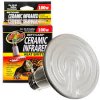- Joined
- Jun 20, 2009
- Messages
- 109
I believe there is a specific health related forum on here but unfortunately I can't find it using the mobile site and the app won't let me log in using my login credentials so I'll post here and maybe a moderator could bump it to the right spot for me.
I took in a young male leopard last spring. Aside from some pyramids on his shell he seemed healthy although he was kept in a mixed species enclosure. After just over 6mon with no issue I put him in with my other leopard tortoise and now about 3mon later he has a runny nose and weezy breathing. After calling every vet in the city to find the one most familiar with exotics I rushed him to the vet (who was not knowledgeable in the LEAST sighhh) and after much back and forth was finally given a prescription for clarithromycin to be administered orally with food at a dose of 1.2ml every other day (for a 5.5lb tortoise). Over the course of 10 day I'm only to give this to him 5x then discontinue but I see others here that have had to use it for far longer before the symptoms cleared up. I'm nearing the end of the prescribed time. Do I keep giving it to him? Do I request a different drug? No swabs or tests were completed, all this "exotic pet vet" did was look on her own vet forum. She also recommended injections which I'd rather not do unless necessary, I'm just wondering if I've given the clarithromycin a fair chance at only 5 doses? I'd hate to stop an antibiotic half way if I should keep going. Unfortunately my regular herp vet is no longer practising and relocated so I'm stuck with vets that have little or no knowledge on the subject.
I took in a young male leopard last spring. Aside from some pyramids on his shell he seemed healthy although he was kept in a mixed species enclosure. After just over 6mon with no issue I put him in with my other leopard tortoise and now about 3mon later he has a runny nose and weezy breathing. After calling every vet in the city to find the one most familiar with exotics I rushed him to the vet (who was not knowledgeable in the LEAST sighhh) and after much back and forth was finally given a prescription for clarithromycin to be administered orally with food at a dose of 1.2ml every other day (for a 5.5lb tortoise). Over the course of 10 day I'm only to give this to him 5x then discontinue but I see others here that have had to use it for far longer before the symptoms cleared up. I'm nearing the end of the prescribed time. Do I keep giving it to him? Do I request a different drug? No swabs or tests were completed, all this "exotic pet vet" did was look on her own vet forum. She also recommended injections which I'd rather not do unless necessary, I'm just wondering if I've given the clarithromycin a fair chance at only 5 doses? I'd hate to stop an antibiotic half way if I should keep going. Unfortunately my regular herp vet is no longer practising and relocated so I'm stuck with vets that have little or no knowledge on the subject.
